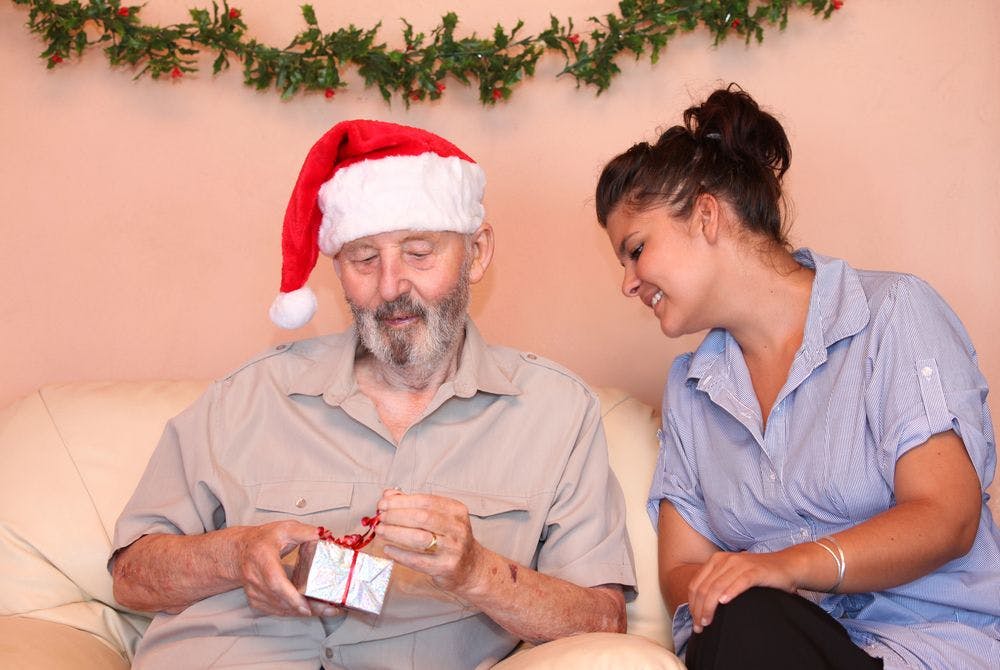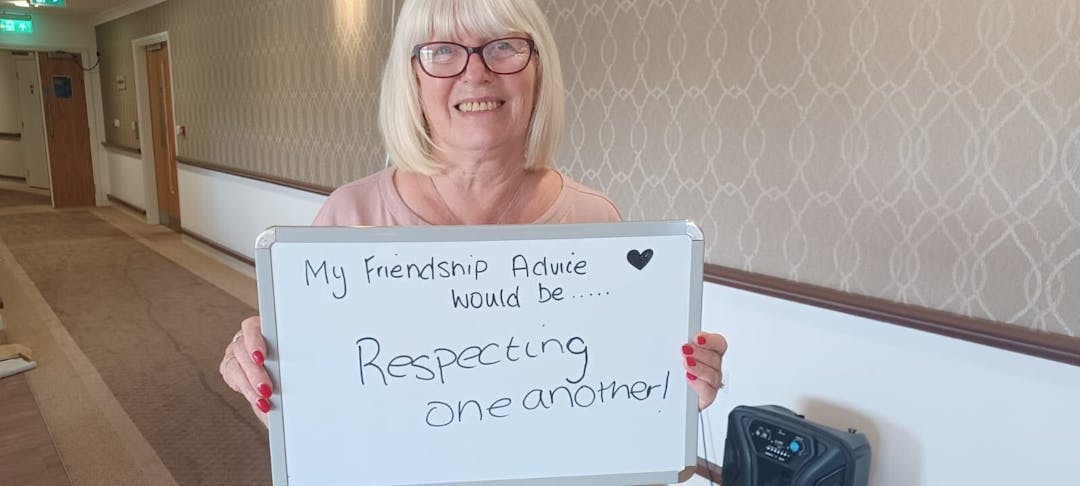Christmas Anxiety For Carers: Tips On Coping With Stress, Depression and Anxiety

Estimated Reading Time: 8 minutes
Whilst most people can relax, unwind and enjoy the festive cheer during the holiday period, Christmas can be a challenging time for carers.
From the responsibilities and worries that come with taking care of a loved one to additional pressures to join in with typical Christmas activities, many carers are at greater risk of experiencing anxiety and stress.
With this in mind, we’ve explained what Christmas anxiety is, why it can be a difficult time for carers and ways carers can manage Christmas anxiety - including services and support.
Arrange care at home
Browse the best home care in your area.
In this article:
- Christmas anxiety
- Why Christmas can be a hard time for carers
- Ways to manage Christmas anxiety as a carer
- Services and support for Christmas anxiety
Our research has found a surge in carers turning to Google to cope with ‘Christmas anxiety’ as we approach the festive period:
| Christmas anxiety search term | How much more are people searching for it? |
|---|---|
| ’Christmas anxiety’ | + 3,100% |
| ’Christmas stress’ | + 743% |
| ’Christmas depression’ | + 743% |
| ’Carer stress’ | + 27% |
| ’Carer depression’ | + 56% |
Source: Google Keyword Planner search data from October to December 2022
Christmas Anxiety
Christmas anxiety involves feelings of worry or panic in the run-up to Christmas. This can involve feeling pressured to attend social events and keep up with traditions that naturally come with the festive period. It’s perfectly normal to experience Christmas anxiety - especially if you have caregiving responsibilities.
It’s no surprise we’ve seen a surge in carers seeking support during the festive period. Whilst being a carer for a family member is very rewarding, it can also be challenging at times, with the pressures of caregiving responsibilities becoming greater over Christmas.
Similarly, whilst the festive season often brings friends and family together, carers are often at risk of feeling isolated, as they may be unable to attend social events and plans due to their caregiving responsibilities. This can leave carers feeling alone to deal with their caregiving duties.
As a carer, it's important to acknowledge how you feel and make sure you’re putting your own wellbeing first - both emotional and physical. Being a carer for a loved one can be both rewarding and challenging, and it’s normal to feel a whole range of emotions - especially during the Christmas period.
Remember, it’s okay to take time for yourself. From taking time out of your day to unwind, to seeking out emotional support, becoming familiar with the support systems available to carers will make a big difference.
We can help you find the best home carer for you or your loved one’s care needs, including domiciliary (hourly) and live-in carers. Request a free list of home care agencies, and our care experts will match you with suitable carers with availability in your local area.
Why Christmas Can Be a Hard Time For Carers
Christmas can be a difficult time for anyone, including carers. You may really enjoy Christmas, but find it tough to celebrate it how you’d like. Below, we’ve gone over some of the reasons that Christmas and the festive period in general can feel tough.
Financial difficulties
Worrying about money can have a big impact on your emotional wellbeing. Christmas is often an expensive time of year, and caring for a loved one or somebody else can further add to this cost.
Staying on top of everything
There are lots of things to think about over Christmas. Trying to stay on top of these practicalities can lead to anxiety. Often, it’s simply a case of finding enough time to do everything over the festive period.

Loneliness
If you’re a carer at Christmas then you might find it difficult to properly connect with others. You may feel like you can’t join in with Christmas celebrations. Spending Christmas in a care home or hospital can also take some getting used to.
Seven Ways to Manage Christmas Anxiety as a Carer
We understand that for carers (unpaid and paid) and many other people, Christmas can be an anxious and unsettling time. Here are seven ways to help you manage Christmas anxiety during the festive period.
1. Plan ahead if you can
Planning your festive schedule in advance can help ease any worries about balancing celebrations, social events and caregiving responsibilities. Similarly, if your loved one likes to follow a routine, talking to them about the festive season and your plans can help them adjust to any changes within their daily routine.
2. Acknowledge and recognise your feelings
It’s normal to experience a range of emotions as a carer, especially over the Christmas season. However, it’s important to acknowledge how you really feel and not bottle any emotions up - as this can leave you feeling under more pressure than before.
Try not to push any feelings aside. Allow yourself to recognise and accept the emotions you’re feeling at that time.
3. Take time out of your day for yourself
Take time out of your day to focus on the present - this can help ease any worries surrounding the future.
Try to take slow deep breaths and focus on the here and now. Focusing on your breathing helps your body to destress and alleviate anxiety over the holidays. Making time to do something you enjoy such as any hobbies and interests can also be really effective stress management techniques.
The NHS has a great article on mindfulness and how this helps mental wellbeing.
4. Share how you’re feeling
Opening up about how you feel can really help. If you’re able to, you can open up to the family member you're caring for or friends and family. You can work together to find support that works for you and the person you’re caring for.
If you don’t feel comfortable sharing these feelings with friends and family, you can talk to other carers in your area. They’ll be familiar with what you’re going through and may be able to suggest solutions that have worked for them.
5. Don’t be afraid to ask for support
As a carer, you must be able to take time for yourself over the festive period. Don’t be afraid to ask a friend or family member for additional help or support. Most people don’t realise the additional pressures carers face every day. However, by opening up to those you trust. you’ll be able to work together in finding support that works for you and your loved one.
6. Access financial help
Christmas is an expensive time of year and can bring additional financial worries on top of caregiving responsibilities - especially if you’ve had to give up your career or reduce your working hours. With that said, you may be able to claim financial support from your local council.
It’s important to become familiar with the support that's available to you as a carer. Following a carer's assessment with your local council, you may be eligible for:
- A carer’s personal budget - also known as Carer’s Allowance
- Financial support for additional care services to meet your loved one's needs
- Other carer benefits
7. Look for alternative care
If you’re finding it tough to keep up with caregiving responsibilities over the festive season - particularly if you’re an unpaid or informal carer - then looking for alternative care will help to relieve some of your duties.
Residential care homes are perfect if your loved one requires help with day-to-day personal care tasks like washing themselves, getting dressed/undressed and using the toilet. Meanwhile, nursing care homes employ trained nurses who are able to care for residents with greater support needs.
Respite care homes provide a temporary form of care, allowing you to take a short break - something that many carers opt for over the busiest periods of the year.
Another alternative care option is home care. If your loved one doesn’t want to leave their familiar home environment then home care helps to ensure they’re looked after in comfortable surroundings.

Services and Support For Christmas Anxiety
Mind has several services to help carers and other people cope over the festive period (and throughout the year):
- Mind’s helplines provide information and support by phone and email
- Local Minds offer face-to-face services across England and Wales. These services include talking therapies, support and advocacy in care
- Side by Side is Mind’s supportive online community for anyone to access
Other organisations that provide similar services include:
We’re on a mission to support individuals and their loved ones throughout each stage of their later living journey. For more information, check out everything Lottie has to offer.



